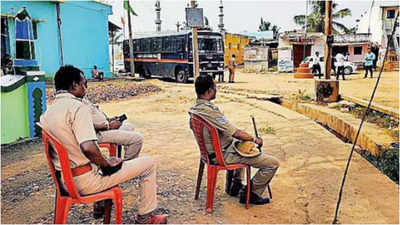
The conflict in Kadakol is rooted in ongoing land disputes across Karnataka, where several rural communities face uncertainties after receiving notifications of land reassignments to the Karnataka State Board of Waqfs. Villagers, many of whom hold ancestral ties to their lands, have voiced concerns over government notices that reclassify these properties as Waqf holdings. The claims have stirred fear and anger among landowners who worry about losing property ownership without proper legal recourse.
In Haveri, the flashpoint occurred after residents grew frustrated with what they allege are unilateral claims by the Waqf Board. Community leaders and activists contend that the notices lack clarity and transparency, further fueling suspicions that the process sidesteps necessary legal protections for landowners. The Waqf Board, on the other hand, maintains that it has rightful claims to certain parcels of land under Islamic endowment laws, and states that any disputes should be resolved in court. Karnataka Waqf Minister B.Z. Zameer Ahmed Khan has defended the Board’s actions, stating that the notices were issued legally, as the land in question is classified as Waqf property.
Politicians from opposing parties have seized upon the issue, amplifying tensions as they voice contrasting positions. The ruling Congress party has downplayed fears, with ministers asserting that no land will be taken forcibly from farmers. Congress leader and Karnataka cabinet minister M.B. Patil, following a visit to a neighboring village facing similar disputes, assured residents that ownership documentation would be closely examined and that legal rights of landholders would be upheld. Patil’s reassurances, however, have done little to alleviate community unease, with many residents remaining skeptical given the Board’s recent actions.
On the other side, leaders from the opposition Bharatiya Janata Party (BJP) have criticized the state government’s handling of the situation. BJP MP Tejasvi Surya, alongside other party members, accused the Waqf Minister of bypassing due process in pushing through reassignments that ignore the rights of non-Muslim landowners. Surya, after visiting affected farmers in Vijayapura district, argued that the government’s actions infringe upon the livelihood of rural residents, especially in instances where ancestral property is involved. He questioned the legality of the Waqf Board’s claims and called for a thorough investigation into what he deemed an "overreach" of jurisdiction by state authorities.
The escalating disputes have highlighted the broader challenges faced by the Waqf Board as it seeks to reclaim lands it considers historically endowed, which reportedly include thousands of acres across Karnataka. Opposition leaders, however, argue that the Board’s recent claims disproportionately impact non-Muslim landowners and urge for amendments to the Waqf Act to prevent land disputes from escalating into communal strife.
